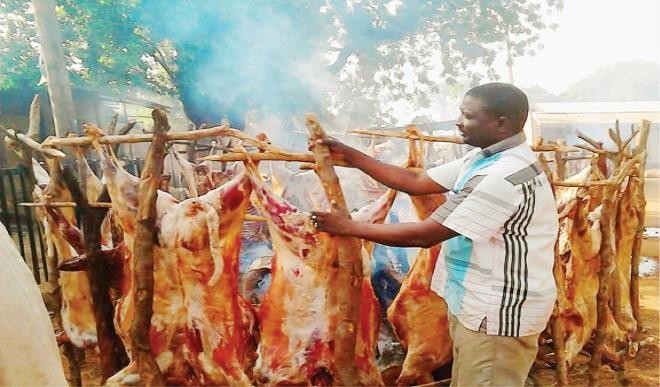Savouring Sokoto’s delicious ram-roasting technique
The festival of Eid-el-Adha, usually marked by slaughtering of sacrificial animals, was held in Sokoto State in its usual distinctive style. In Sokoto, there is a unique way of preparing the animal for consumption and storage. The process is called Tareni. Tareni involves long processes, starting with the slaughtering of the sacrificial animal by a […]


The festival of Eid-el-Adha, usually marked by slaughtering of sacrificial animals, was held in Sokoto State in its usual distinctive style.
In Sokoto, there is a unique way of preparing the animal for consumption and storage. The process is called Tareni.
Tareni involves long processes, starting with the slaughtering of the sacrificial animal by a cleric or even the owner, who wishes to do it himself.
After slaughtering, butchers are contracted on an agreed fee usually between N700 and N1, 000 to do the skinning of the animal, remove the intestines, sever the head and limbs and leaving only the torso.
The torso is ripped open and using two sticks for both the front and rear limbs, it is spread wide and allowed to dry. Salt is sprinkled on the whole body for taste.
After the butchers complete their part, youths, either volunteers or on contract, take over. For contracted youths overseeing the roasting exercise, the price varies from one place to another but on the average they are paid N1, 000, which includes firewood and labour.
They would clean up a portion of land where they dig a small round pit, place a v-shaped stick and tie the animals to it, giving it a ring shape.
In the middle of the rounded animals, a large fire is prepared using huge dried trees branches.
To protect the fire from the wind, the youths use cornstalk beds to cover the cycle of prepared rams so that they get unswerving contact with the blazing fire.
The most challenging aspect of the roasting exercise is defying the raging fire to move the rams to desired positions where the fire can roast them properly.
Each ram is marked for easy identification by owners since some families can present two or more rams depending on their financial status.
About 10-12 households can do their roasting at a chosen spot and the spot remains until something overtakes its usage, such as building or road construction.
Roasting fields in some areas remain for as long as possible, they could last for decades unhampered. The roasting takes the whole day, sometimes running into the early hours of the next day until all animals tied to the sticks are certified okay for consumption.
After all the rams are certified roasted, the youths would bring them down from the stake one after the other, and take them to the owners for the agreed fees.
The Tareni is placed on a cornstalk bed or any available hygienic flat object until morning when it would have cooled down and the oil dried up.
Members of a household would then gather to enjoy the meat. Mostly the head or a senior member of the household oversees the cutting of Tareni into pieces for consumption and giving out to neighbours, relatives as well as the less privileged.
Those who spoke to Daily Trust on this special Sokoto cuisine said it is tastier and easier to distribute than the raw meat.
Fifty-six-year old FarukShehu says right from his childhood, Tareni has always been his choice.
“I prefer Tareni for its taste and it is also easier for our women to fry than the raw one. Even though it costs us some money but we are used to it and feel better with it than taking raw meat to our wives to fry for us,” he asserted.
Similarly, Alhaji LiyeDambuwa, 42, said “It is our tradition to roast our sacrificial animals. Each year, parents and children look forward to Tareni because it has a unique taste and allows for easy storage by drying it in the sun on daily basis after the usual frying by our women. The sun drying helps in preserving the meat.”
Notwithstanding the advent of modern technology, the Tareni technique has remained unhampered.
The same old method has continued to be used, which perhaps explains why as soon as Eid-el-Adha is approaching, l woods and specials sticks used in preparing Tareni are displayed for sale.
